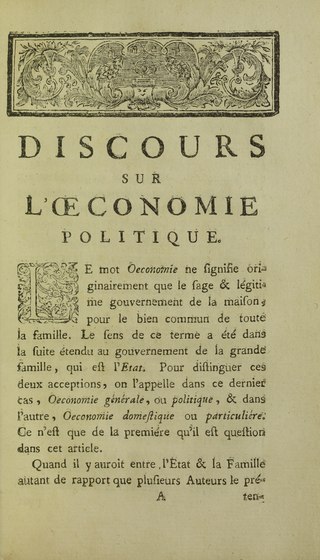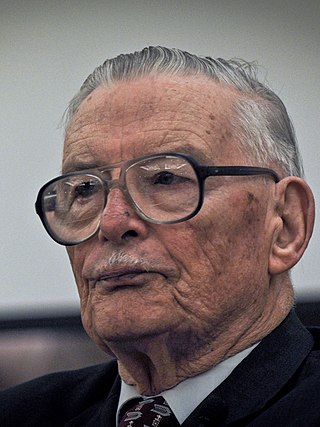
Federalism is a mode of government that combines a general government with regional governments in a single political system, dividing the powers between the two. Federalism in the modern era was first adopted in the unions of states during the Old Swiss Confederacy.

A government is the system or group of people governing an organized community, generally a state.
A state is a centralized political organization that imposes and enforces rules over a population within a territory. Definitions of a state are disputed. One widely used definition comes from the sociologist Max Weber: a "state" is a polity that maintains a monopoly on the legitimate use of violence, although other definitions are common. Absence of a state does not preclude the existence of a society, such as stateless societies like the Haudenosaunee Confederacy that "do not have either purely or even primarily political institutions or roles". The level of governance of a state, government being considered to form the fundamental apparatus of contemporary states, is used to determine whether it has failed.

Sovereignty or a sovereignty construct like a nation state can generally be defined as supreme authority. Sovereignty entails hierarchy within the state, as well as external autonomy for states. In any state, sovereignty is assigned to the person, body or institution that has the ultimate authority over other people in order to establish a law or change existing laws. In political theory, sovereignty is a substantive term designating supreme legitimate authority over some polity. In international law, sovereignty is the exercise of power by a state. De jure sovereignty refers to the legal right to do so; de facto sovereignty refers to the factual ability to do so. This can become an issue of special concern upon the failure of the usual expectation that de jure and de facto sovereignty exist at the place and time of concern, and reside within the same organization.

In moral and political philosophy, the social contract is a theory or model that originated during the Age of Enlightenment and usually, although not always, concerns the legitimacy of the authority of the state over the individual.

Political economy is a branch of political science and economics studying economic systems and their governance by political systems. Widely studied phenomena within the discipline are systems such as labour markets and financial markets, as well as phenomena such as growth, distribution, inequality, and trade, and how these are shaped by institutions, laws, and government policy. Originating in the 16th century, it is the precursor to the modern discipline of economics. Political economy in its modern form is considered an interdisciplinary field, drawing on theory from both political science and modern economics.

James McGill Buchanan Jr. was an American economist known for his work on public choice theory originally outlined in his most famous work, The Calculus of Consent, co-authored with Gordon Tullock in 1962. He continued to develop the theory, eventually receiving the Nobel Memorial Prize in Economic Sciences in 1986. Buchanan's work initiated research on how politicians' and bureaucrats' self-interest, utility maximization, and other non-wealth-maximizing considerations affect their decision-making. He was a member of the Board of Advisors of The Independent Institute as well as of the Institute of Economic Affairs, a member of the Mont Pelerin Society (MPS) and MPS president from 1984 to 1986, a Distinguished Senior Fellow of the Cato Institute, and professor at George Mason University.

A federation is a political entity characterized by a union of partially self-governing provinces, states, or other regions under a central federal government (federalism). In a federation, the self-governing status of the component states, as well as the division of power between them and the central government, is constitutionally entrenched and may not be altered by a unilateral decision, neither by the component states nor the federal political body. Alternatively, a federation is a form of government in which sovereign power is formally divided between a central authority and a number of constituent regions so that each region retains some degree of control over its internal affairs.
Race to the bottom is a socio-economic phrase to describe either government deregulation of the business environment or reduction in corporate tax rates, in order to attract or retain economic activity in their jurisdictions. While this phenomenon can happen between countries as a result of globalization and free trade, it also can occur within individual countries between their sub-jurisdictions. It may occur when competition increases between geographic areas over a particular sector of trade and production. The effect and intent of these actions is to lower labor rates, cost of business, or other factors over which governments can exert control.
A confederation is a political union of sovereign states united for purposes of common action. Usually created by a treaty, confederations of states tend to be established for dealing with critical issues, such as defence, foreign relations, internal trade or currency, with the central government being required to provide support for all its members. Confederalism represents a main form of intergovernmentalism, defined as any form of interaction around states that takes place on the basis of sovereign independence or government.
In politics, a regime is the form of government or the set of rules, cultural or social norms, etc. that regulate the operation of a government or institution and its interactions with society. The two broad categories of regimes that appear in most literature are democratic and autocratic. However, autocratic regimes can be broken down into a subset of many different types. The key similarity between all regimes are the presence of rulers, and either formal or informal institutions.
In American political discourse, states' rights are political powers held for the state governments rather than the federal government according to the United States Constitution, reflecting especially the enumerated powers of Congress and the Tenth Amendment. The enumerated powers that are listed in the Constitution include exclusive federal powers, as well as concurrent powers that are shared with the states, and all of those powers are contrasted with the reserved powers—also called states' rights—that only the states possess.

In the United States, federalism is the constitutional division of power between U.S. state governments and the federal government of the United States. Since the founding of the country, and particularly with the end of the American Civil War, power shifted away from the states and toward the national government. The progression of federalism includes dual, cooperative, and new federalism.

Regional Integration is a process in which neighboring countries enter into an agreement in order to upgrade cooperation through common institutions and rules. The objectives of the agreement could range from economic to political to environmental, although it has typically taken the form of a political economy initiative where commercial interests are the focus for achieving broader socio-political and security objectives, as defined by national governments. Regional integration has been organized either via supranational institutional structures or through intergovernmental decision-making, or a combination of both.
Dual federalism, also known as layer-cake federalism or divided sovereignty, is a political arrangement in which power is divided between the federal and state governments in clearly defined terms, with state governments exercising those powers accorded to them without interference from the federal government. Dual federalism is defined in contrast to cooperative federalism, in which federal and state governments collaborate on policy.

Daniel Judah Elazar was a political scientist known for his seminal studies of political culture of the US states. He was professor of political science at Bar-Ilan University in Israel and Temple University in Pennsylvania, and director of the Center for the Study of Federalism at Temple University and the founder and president of the Jerusalem Center for Public Affairs.
Vincent Alfred Ostrom was an American political economist and the Founding Director of the Ostrom Workshop based at Indiana University and the Arthur F. Bentley Professor Emeritus of Political Science. He and his wife, the political economist Elinor Ostrom, made numerous contributions to the field of political science, political economy, and public choice.
The Constitution of India establishes the structure of the Indian government, including the relationship between the federal government and state governments. Part XI of the Indian constitution specifies the distribution of legislative, administrative and executive powers between the union government and the States of India. The legislative powers are categorised under a Union List, a State List and a Concurrent List, representing, respectively, the powers conferred upon the Union government, those conferred upon the State governments and powers shared among them.
World federalism or global federalism is a political ideology advocating a democratic, federal world government. A world federation would have authority on issues of global reach, while the members of such a federation would retain authority over local and national issues. The overall sovereignty over the world population would largely reside in the federal government.







